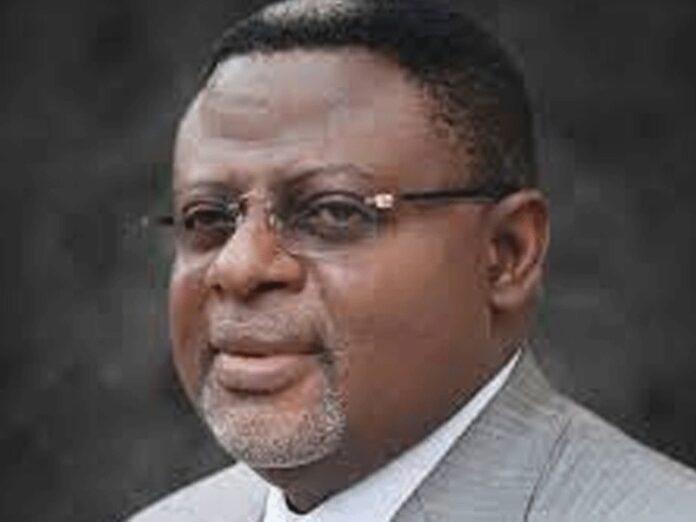•Says state to acquire 640mw FG’s NIPP, retrieve Tinapa from AMCON
•Defends payment of security votes to governors
Chigozie Amadi
The Governor of Cross River State, Mr Bassey Otu, yesterday vowed to ensure that the ceding of Bakassi to Cameroon was revisited by the federal government, maintaining that any decision taken by any party to the dispute must be mutually agreed upon.
Speaking on Arise Television, Otu stressed that aside the fact that some Bakassi ancestors were buried in the land in the area in dispute, Nigeria lost some soldiers who were on the frontline to ensure that Bakassi remained a Nigerian territory.
He argued that the consent of the people was not sought before the land was handed over to the new owners, explaining that as a bold and courageous leader, he had no doubt that President Bola Tinubu will take up the matter at the appropriate time.
In October 2002, the International Court of Justice (ICJ) delivered a judgment being the consequence of a suit instituted in 1995 by the Republic of Cameroun claiming sovereignty over the oil-rich Bakassi Peninsula.
But Otu maintained that it wasn’t a closed case, insisting that the complexity involved in the matter which favoured Cameroon at the time, is not something to be accepted wholesale.
“ Yes, it’s not a closed case because it’s not something that we can accept and walk away. Our ancestors are buried in those areas. We lost our soldiers who were defending the frontline in trying to make sure that Bakassi remained a Nigerian territory.
“And if for whatever reason, it must be handed over, I believe that the consent of the people should be sought and due process should have been followed. But it was not followed. And those are issues that you cannot sweep under the carpet.
“Because if we do, what are we going to tell the next generation, that it was in this generation that our assets, our land, and everything was forcefully taken? That has impoverished us to the limit that we are struggling. And when we look at our state, it’s quite a rich state,” the governor added.
Whichever way it goes, the governor insisted that the case must end in a mutual understanding, where the grievances of the people must be assuaged. He noted that the position of the government and the legislature in the state is that Bakassi must not be ‘allowed to go like that’.
“I agree that we cannot do it alone. We are discussing with the federal government and it is not unmindful of the fact that we are suffering seriously because of the actions and decisions which were taken by the federal government.
“ They know very well the pains. And we have a president that is down to earth, a president that is courageous and strong. A president that can take decisions. And this president also believes in people first. That is why he’s trying to mitigate and ameliorate the problems of Nigeria amid the policies that he’s entrenching in the system,“ he added.
He expressed the belief that the federal government and the international community will be on the side of Bakassi people, stressing that although he wasn’t giving deadlines, it will be very difficult to sleep without the people being rightly treated.
Besides, the governor said that his government was proceeding with the acquisition of the federal government’s 640mw National Integrated Power Project to boost power supply in the state, explaining that he was also in the process of retrieving the popular Tinapa resort from the Asset Management Corporation of Nigeria (AMCON).
Otu, who also spoke on the just-concluded third international business summit and investment opportunities organised by the state government, noted that it had become clear that to move forward, the state has to build some good network, both at home and abroad.
He explained that the state was looking to make sure that agribusiness becomes number one in the state, stressing that their was therefore the need to boost power supply, energy security, food security and sufficiency enough for consumption and for exports.
“We already have a plant that can do 33.4mw and we are looking to acquire the NIPP facility in the state, which has over 640mw. The two put together will give us full energy sufficiency, and we will even export to other states and of course other territories or even countries that will require power.
“And we are laying adequate foundations to that. The 33mw that we have, we are trying to extend the gas pipeline, which in some maybe three to five months, we should be able to get the gas there to power the plants. That’s a low-hanging fruit that will come up.
“The other ones, immediately we finish negotiations with the federal government, I think that will also come online. So by that deregulation, with the new electricity law, it has given powers to states to manage their power,” he stated.
On Tinapa, Otu said it remains very important to the state, explaining that it is not just about tourism alone, but building on the achievements of his predecessors.
“But because of some issues, AMCON took it over, but I’m taking it over from AMCON, we’ve reached what I call the FID, that’s the final investment decision in terms of paying AMCON to take back the assets. And Tinapa is going to be the second, what I would say, export processing zone that we’re setting up.
“One is in Ikom, which is powered by the Afrexim Bank, and then the other one is in Calabar, which the Cross River State government is driving it. So very soon Tinapa is going to come alive. We are putting everything in place,” he assured.
The governor pointed out that aside the destruction done to the facility during the Endsars crisis, the structures there, built by a top-notch construction company, still remain largely intact.
“If we look at the facilities there and the structures, they are still alive. It’s just to inject life and activities into the facility, then everything will be up and doing,” Otu explained.
On the 76 oil wells that were taken from the state, Otu stated that it had made things very tough for the state, insisting that it’s an issue that the state is still working on.
“We believe that sooner or later justice will be done, because actually we have oil in Cross River State. And besides that, it doesn’t mean that we’ll lose our oil wells.
“And then at no time was there a referendum that Bakassi should be ceded to whatever authorities. So we believe that in terms of getting our assets back, that we will do. And then we are still talking with the federal government and even the international community to see what adequate compensation can be done.
“There was something like stabilisation which was used to augment, but for a long time, we’ve not seen that again. It’s one of the items that we will be renewing very soon to make sure that it comes on board. But besides that, it’s been very tough for us, because the earlier expenditures by my predecessors were based on the fact that we had 76 oil wells to leverage on,” he stressed.
Despite the challenges, the governor said the state has doubled its Internally Generated Revenue (IGR) and was ensuring transparency and accountability in its operations.
On the state-owned Cali Airline, the governor stated that the state was in the process of having an additional five aircraft and will expand its routes to build strength and earn foreign exchange, noting that without a sound business plan, no airline will succeed.
He also lauded the federal government’s coastal road project from Lagos to Ogun, Ondo State, Delta, Edo, Bayelsa, Rivers, Akwa Ibom, and then Cross River State, insisting that the road is important to the state.
Speaking on the controversial security vote of governors and the alleged opacity surrounding it, he said: “It is better to buy peace at any cost than to pay for war and to pay for a society that nobody can sleep. It costs a lot to maintain peace all over the world.
“And there’s no country, let nobody deceive you, that will come out with their budget for security. It’s left for state governors to just be honest with their people and honest to themselves. Like my own state, we don’t have much money, but we have a coastal line that is so vast.
“We have a land boundary with very rugged neighbours. I don’t want to call names here so that it doesn’t cause some diplomatic row. And when you look at, from Cross River, when you look at from Bakassi to Yala, it’s something like almost 400 to 600 kilometres.
“It becomes a real problem to actually police these particular boundaries. …At long last, what will allow for reduced expenses on security is where people are engaged, where there’s employment and people are able to move on and where there’s hope for the future,” he added.

























